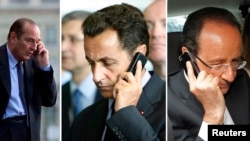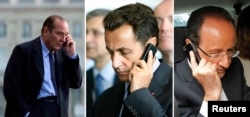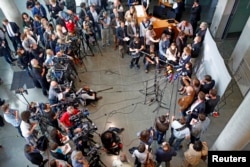U.S. President Barack Obama reaffirmed to his French counterpart the United States' commitment to end spying tactics considered "unacceptable" by its allies.
The conversation between Obama and President Francois Hollande occurred Wednesday, a day after whistleblower website WikiLeaks released documents that purported to show the U.S. National Security Agency (NSA) had spied on former French Presidents Jacques Chirac and Nicolas Sarkozy as well as Hollande, from 2006 to 2012.
"President Obama reiterated unequivocally his firm commitment ... to end the practices that may have happened in the past and that are considered unacceptable among allies," the French president's office said in announcing the conversation.
The White House said later Wednesday Obama told Hollande that the U.S. was abiding by a commitment Obama made in 2013 not to spy on the French leader after Edward Snowden disclosed the extent of NSA surveillance powers.
Earlier Wednesday, the French Foreign Ministry summoned U.S. Ambassador Jane Hartley to meet with French Foreign Minister Laurent Fabius to explain the spying allegations. The U.S. Embassy declined to comment.
Hollande also held an emergency meeting of his ministers and army commanders after the release of the documents, which were published by WikiLeaks in partnership with French newspaper Liberation and the Mediapart website.
France is also sending a top intelligence official to Washington to confirm the spying is over, government spokesman Stephane Le Foll said.
"We have to verify this spying has finished," Le Foll told reporters Wednesday. "Between allies this is unacceptable and incomprehensible. France does not spy on its allies."
The latest revelations of espionage among Western allies come after it emerged in late 2013 the NSA had spied on Germany and that Germany's own BND intelligence agency had cooperated with the NSA to spy on officials and companies elsewhere in Europe.
Addressing parliament later in the day, Prime Minister Manuel Valls called the allegations very serious.
Valls said the United States must recognize the danger they posed to freedom and also do everything in its power to quickly repair the damage in U.S.-French relations.
French vote on spying law
Ironically, the leak came a day before Wednesday's vote in the French parliament on a controversial new law granting the state sweeping powers to spy on its citizens.
The White House said it was not targeting Hollande's communications and will not do so in the future, but it did not comment on past activities.
France's ambassador to the U.S., Gerard Araud, appeared to downplay the revelations, saying on Twitter: "Every diplomat lives with the certainty that their communications are listened to, and not by just one country. Real world."
Le Foll said Paris had not decided whether to launch legal proceedings as Germany had done but, amid calls from some for retaliation, played down diplomatic consequences.
"In the face of threats that we face and given the historic ties linking us, we have to keep a perspective," he said. "We're not going to break diplomatic ties."
However, Claude Gueant, Sarkozy's former chief of staff and one of the reported targets of the NSA, told RTL radio: "I feel like trust has been broken."
'Who gave the order?'
Dominique Moisi, senior adviser to the French Institute for International Relations in Paris, said, “Somewhere, something went wrong in the decision-making process in Washington. Who gave the order? ... It would be very interesting to know the chain of command.”
Still, Moisi said France and the United States need each other too much for lasting damage.
“France will call for an apology. A formal one would be better than a subdued, private one. And I think apologies are needed. They will remain close friends and allies," he said.
"But this will leave a little scar. And this was, to say the least, unwelcome," Moisi added.
German probe
Earlier this month, Germany's top public prosecutor closed a year-long probe into the suspected tapping of Merkel's cellphone by U.S. spies.
The leaked documents include five from the NSA, the most recent dated May 22, 2012, just days after Hollande took office.
The documents include apparent U.S. government cables discussing Hollande’s worries about the Greek eurozone crisis and Sarkozy mulling restarting Middle East peace talks without Washington’s involvement.
A member of Sarkozy’s now-rebranded The Republicans party described the reports as scandalous.
Party member Eric Ciotti told France Info radio that Washington needs to provide an explanation and also apologize for apparent practices he called undignified.
But analyst Philippe Moreau Defarges of the French Institute of International Relations believes the controversy will soon fade.
“It’s a not a surprise. Today, I think WikiLeaks is an old question. Today, there are other priorities, concerning the Middle East, concerning the Mediterranean …that’s why I think it will be very quickly forgotten,” Defarges said.
The documents also included summaries of conversations between French officials on the global financial crisis, the future of the European Union, ties between Hollande's administration and Merkel's government, and contained cell phone numbers of officials in the Elysee presidential palace, including the cell phone of the president, WikiLeaks said.
Lisa Bryant contributed to this report from Paris and Sarah Williams contributed to this report from Washington. Some material for this report came from Reuters, AP and AFP.








